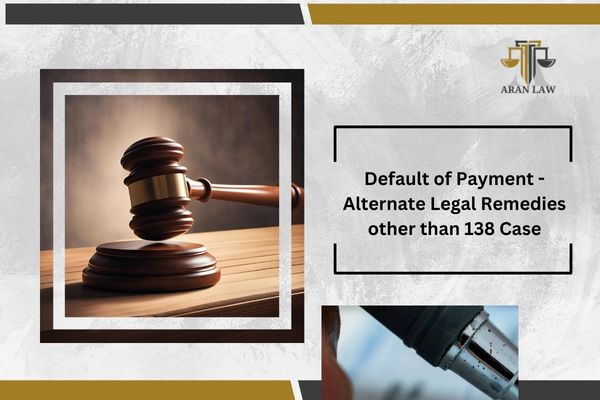When a cheque bounces, most immediately think of Section 138 of the Negotiable Instruments (NI) Act. While Section 138 is essential, the legal system offers multiple powerful tools beyond this section to ensure justice and swift recovery of your dues. Being aware of these alternatives can significantly strengthen your legal position. Here’s an expanded look at the comprehensive strategies available to protect your financial interests the alternate legal remedies other than 138 Case.
Beyond Section 138: Your Complete Legal Arsenal
1. Order 37 CPC (Summary Suit)
Cheque bounce disputes can effectively be tackled through Order 37 of the Civil Procedure Code (CPC). This provision facilitates quick civil recovery of the cheque amount along with accrued interest. Because it involves simplified and expedited court procedures, Order 37 CPC significantly reduces delays, allowing claimants to receive faster and smoother settlements.
Practical Tip: Consider combining your Section 138 proceedings with an Order 37 suit to create maximum legal pressure, prompting quicker settlements or payments.
2. Section 420 IPC (Cheating)
If a cheque is knowingly issued without sufficient funds with the intent to deceive, this act constitutes criminal cheating under Section 420 of the Indian Penal Code (IPC). Such offenses are considered serious criminal acts and are punishable with imprisonment of up to seven years along with potential fines.
Landmark Case: Rajesh Bajaj v. State NCT of Delhi – clearly establishes that intentionally issuing a cheque knowing it would bounce qualifies as criminal cheating.
Practical Tip: Filing a First Information Report (FIR) under Section 420 IPC not only amplifies your claim but also significantly improves your negotiating power and leverage, compelling the issuer to settle swiftly.
Also Read : Cheques Issued for Time-Barred Debt – Legal Enforceability
3. Insolvency & Bankruptcy Code (IBC) Route
For corporate debtors, bounced cheques can trigger insolvency proceedings under the Insolvency & Bankruptcy Code (IBC), provided the outstanding amount exceeds ₹1 Crore. Initiating insolvency actions can severely affect a debtor’s financial stability, operations, and market reputation, prompting rapid settlements.
Practical Tip: Employing the IBC route for high-value cheque bounce cases can exert immense pressure on corporate debtors, significantly enhancing your chances of swift recovery.
4. Negotiable Instruments Act Amendments (2018)
The 2018 amendments to the NI Act considerably strengthened protections for cheque bounce victims:
- Section 143A: Courts are empowered to direct accused individuals to pay interim compensation of up to 20% of the cheque amount during ongoing trial proceedings.
- Section 148: Those appealing convictions must deposit at least 20% of the cheque amount as a precondition for their appeal to be entertained.
These amendments ensure immediate partial financial recovery, minimizing the misuse of legal procedures to delay justice.
Practical Tip: Explicitly invoke Sections 143A and 148 in your legal petitions to secure timely interim relief and expedite final settlements.
Also Read : Section 138 Of The NI Act – Cheque Bounce Case Judgement
Why Cheque Bounce Matters More Than You Think
Neglecting bounced cheques or exclusively relying on Section 138 can lead to:
- Extended Litigation Periods: Prolonged trials that significantly delay your recovery.
- Financial Instability: Cash flow disruptions, especially severe for small and medium-sized businesses.
- Lost Negotiating Strength: Missing out on more powerful legal tools that could yield quicker resolutions.
“Many clients are unaware of the extensive legal remedies available beyond Section 138. Employing these strategic measures can greatly reduce litigation timelines and enhance financial recovery.”
Who Should Take Immediate Note?
- MSMEs frequently dealing in cheque-based transactions.
- Suppliers and service providers regularly receiving post-dated cheques.
- Financial institutions and private lending entities.
- Individuals or enterprises heavily dependent on cheque transactions for their business operations.
- Entities involved in high-value business transactions where cheque dishonor can pose significant financial risks.
At Unimarks Legal Solutions, we offer expert guidance in cheque bounce cases, including:
- Integrated use of diverse legal remedies (Order 37 CPC, Section 420 IPC, IBC proceedings).
- Strategic advisory and representation throughout the cheque recovery process.
- Preventative consultations to identify and mitigate cheque-related fraud risks.
- Proactive litigation strategies aimed at efficient recovery and swift dispute resolution.
- Comprehensive legal representation tailored specifically to your individual or corporate needs.
📩 Facing cheque bounce issues? Connect with us immediately to leverage powerful legal remedies and safeguard your financial interests.
Free Resource: Comprehensive Cheque Bounce Action Checklist
Act promptly and safeguard your financial future!
Download our detailed, step-by-step action checklist outlining immediate measures you should take upon encountering a cheque bounce situation.
✉️ Enter your email here, and we’ll promptly deliver this invaluable resource directly to you.
Final Thought:
“Cheque dishonor is more than financial inconvenience; it represents a severe breach of trust and legal duty. Equip yourself with comprehensive legal strategies to reclaim what’s rightfully yours promptly and effectively.”
Also Read : Nine Most Important judgements to defend the Cheque Bounce Case

